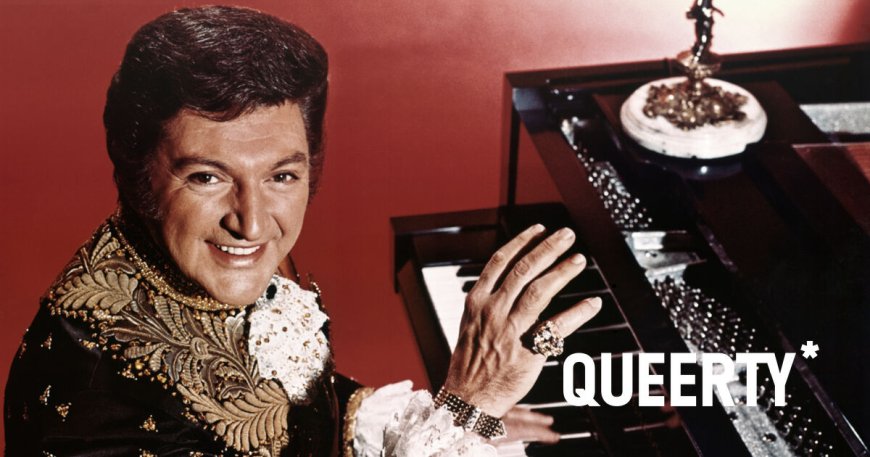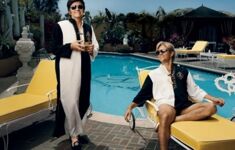How Liberace’s ‘I’ll Be Seeing You’ made him the Queen of Las Vegas
Mr. Showman W?adziu Valentino Liberace was the queen of holding court in the desert.


Kylie Minogue will soon join the likes of Cher, Celine Dion and Lady Gaga this fall when she kicks off her Las Vegas residency at The Venetian’s Voltaire. But before she and all the other queens came to know Sin City as the place to make buckets of money without going on an exhaustive world tour, legendary pianist, singer and ostentatious Mr. Showman Władziu Valentino Liberace was the queen of holding court in the desert.
Beckoning audiences from around the world to the Silver State, Liberace made his self-referential rendition of “I’ll Be Seeing You” his calling card.
With a musical arrangement by legendary Broadway composer Sammy Fain and lyrics by Irving Kahal, “I’ll Be Seeing You” instantly became a classic standard when it was released in 1938. But it took some time to catch on.
Related:
Too gay for TV? 25 fascinating facts about Liberace biopic ‘Behind The Candelabra’
Did you know ‘Behind The Candelabra’ was filmed in Zsa Zsa Gabor’s home?
The song heavily leans on the performer’s vocal skill to bring out the gravitas and grandiose of the melody, and more than a handful of singers put their spin on it.
Canadian pop singer Dick Todd recorded the song in 1940, but it was a 1944 recording by Bing Crosby that certified it as a hit. Frank Sinatra also recorded an orchestra-backed version that also became popular in 1944.
But then Sinatra recorded a new version charted at No. 58 on the Hot 100 and was included on his 1961 album, “I Remember Tommy.” Liberace’s ‘I’ll Be Seeing You,” under Columbia Records, arrived in 1952.
It’s worth noting that he sings the song rather straightforwardly on the record, but it was his combination of visuals and audience interaction that made the song a centerpiece later in his later sparkling Vegas shows.
“I don’t give concerts, I put on a show,” Liberace once said, and that became very true very early on in his career.
Liberace grew up in a musically inclined household and reportedly began playing piano around the age of 4. By the 1930s, he was a young classically trained pianist, cutting his keys with the Chicago Symphony Orchestra and other touring gigs.
But then a higher calling began to pull him away from classical and into camp, and Liberace spent the early 1940s honing what would be his future act in nightclubs around major cities.
By the time he landed performance contracts with some big hotel chains, he had a full production, with jokes, audience interactions and music requests, covering everything from Chopin to the classic cowboy song, “Home on the Range.”
Landing in Las Vegas in 1944, media attention helped his career take off. Playing at the best clubs, Variety proclaimed, “Liberace looks like a cross between Cary Grant and Robert Alda,” after an appearance at the Persian Room in 1945.
“He has an effective manner, attractive hands which [sic] he spotlights properly, and withal, rings the bell in the dramatically lighted, well-presented, showmanly routine. He should snowball into the box office.”
And snowball he did!
The candelabrum became Liberace’s crest, and he made a minor adjustment to his stage name, calling himself, “Liberace—the most amazing piano virtuoso of the present day.”
By 1955, Liberace was reportedly making somewhere around $50,000 per week (more than $500,000 today) at the Riviera Hotel and Casino in Las Vegas and had official fan clubs with a quarter of a million members. With hopes of reaching larger audiences, he turned to TV to help bring his visuals to life and created “The Liberace Show.”
Rings, a dazzling glitter cape and camp, the show gave audiences a peek at Liberace the superstar, and signed off each broadcast with “I’ll Be Seeing You.”
“I’ll be seeing you/In all the old familiar places/That this heart of mine embraces/All day through,” he sings on the song. And for a long stretch of his performative career that was very much true.
Liberace was in major magazines and doing public appearances at venues around the country. He appeared on TV shows outside of his own and became a hot topic as women and men expressed a fascination for his extravagance and growing fan base. From Broadcasts into the United Kingdom, Liberace also reportedly gained a fan in a young Elton John.
“Liberace, ’cause he played the piano, I was very much interested in. He was a good pianist but he was not a great pianist and I was enchanted by him and I loved him,” said the Rocketman in a 2013 interview with NPR.
“You know, his dialogue with the audience was very, very funny, especially when he did live shows. And I did get to meet him.”
Liberace’s critics had similar critiques. “Liberace recreates—if that is the word—each composition in his own image,” wrote one critic after seeing him at Carnegie Hall. “When it is too difficult, he simplifies it. When it is too simple, he complicates it.”
But when has talent ever stood in the way of success?
Tale as old as time, Liberace’s touring and international performance career was slowing down by the ’60s, and he was becoming a novelty act. And so he went off to Vegas to create a show that would lean into his standards and give his fans what they wanted from him: glamor.
Under the sobriquet “Mr. Showmanship,” Liberace created a Las Vegas show fit for a queen. His costumes and capes incorporated ostrich feathers and minks and diamonds, and his stage choreography, entrances and exits included him riding in a Rolls-Royce and dropping in like Peter Pan.
At the height of Liberace’s live Las Vegas shows during the 1970s and ’80s, he had his hand in many money making ventures, from cookbooks to antique stores. He became a major attraction at the Las Vegas Hilton and Lake Tahoe, earning $300,000 a week, and this is also around the time he met and allegedly made a teenaged Scott Thorson his boytoy and eye candy in his show.
Thorson pulled the curtain back on his relationship with Liberace in “Behind the Candelabra: My Life with Liberace,” published after Liberace’s death from AIDS in 1987. There were accusations of sex, drugs and forced plastic surgery on, and this was all dramatized in the spectacular HBO movie starring Michael Douglas and Matt Damon.
Despite being the butt of many jokes about gay men’s affinity for glitter and gold, no one can deny Liberace’s high place in pop culture and how he helped develop what it means to be a diva. And in the end, the lyrics of Liberace’s signature “I’ll Be Seeing You” hold true as true fans can still recognize his influence in the blinding lights of Las Vegas.
“In every lovely summer’s day/In everything that’s light and gay/I’ll always think of you that way/I’ll find you in the morning sun,” the song goes. “And when the night is new/I’ll be looking at the moon/But I’ll be seeing you.”

 Mark
Mark 






